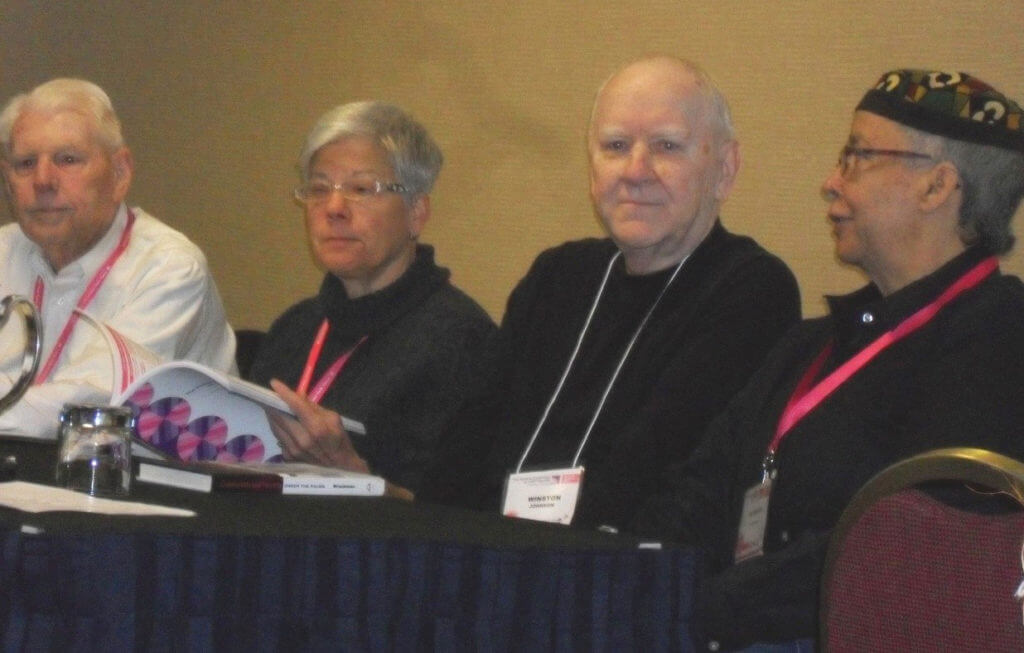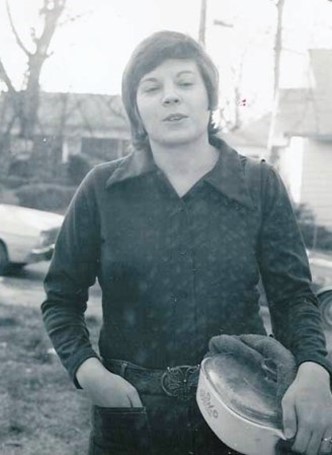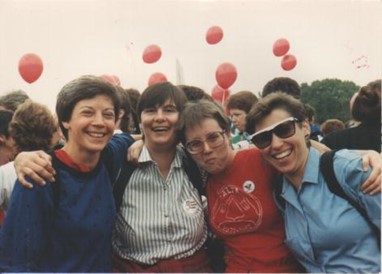Saralyn Chesnut of the Atlanta Lesbian Feminist Alliance (ALFA)

Notes from interviews conducted by Charlene Ball on April 8, 2013, and May 1, 2013
Saralyn Chesnut: Yes. I grew up Southern Baptist in southern Georgia. One of my ancestors, Thomas Pinckney, was governor of South Carolina. He had signed the Declaration of Independence. My grandfather’s name was Emmett Pinckney Doss. I’m definitely Southern. I still work on what it means to be a white Southerner. My mother taught us that racism was wrong. She was a liberal Democrat.
I came to Atlanta in 1973. I was at the University of Georgia from 1966 to 1970. Julia Penelope (Stanley) was my teacher. I majored in linguistics at first. I came out with a sorority sister in college. I was friends with Julia although I didn’t identify with her. I didn’t agree with some of her ideas. For instance, she admired Ayn Rand. Her mother owned a bookstore in Athens, called The Hobbit Habit. (The bookstore sponsored a lesbian softball team called “The Hairy Hobbits.”)
It was not easy to come out in 1970. None of us would have called ourselves “lesbian feminists.” We were not aware of the women’s movement. I went to Florida State University in Tallahassee. I started a master’s degree in linguistics, then switched to American literature. I met my first lesbian friend in graduate school. Thinking of myself as a woman, I became aware of the women’s movement.
I went to Savannah, where I got a job in a methadone clinic run by my brother. I soon moved to Atlanta with a straight woman (just a friend). I couldn’t find lesbians at first. Margaret (my lover) and I were close by then. She had moved to Atlanta, too. We both wanted to find the lesbians. The straight friend who moved to Atlanta with me told me, “All the lesbians live in Little Five Points.” [Little Five Points is an area just east of downtown Atlanta, where the hippies and young progressives congregated.]
Biographical Note
Saralyn Chesnut was born in 1948, in Tifton, Georgia, the daughter of a liberal mother. Saralyn was raised in a conservative town in the segregated South at the beginning of the civil rights movement. She argued about race issues with other kids her age. She vividly recalls making friends with the first Black students – there were only three – to enroll at her formerly all-white high school. She always knew she was different, and she wasn’t sure why… until she fell in love with her roommate and sorority sister at the University of Georgia.
Charis Books and More opened [in Little Five Points] in 1974. I joined Georgians for the ERA (Equal Rights Amendment), which Vicki Gabriner and other lesbians were running. I got to know them. In 1972, ALFA started, but they had no permanent meeting place. Amy Darden (Estelle) started a softball team. There were ALFA parties. I became part of things. Softball was one of my main things. I loved sports. There was Womansong Theatre in 1979. Red Dyke Theatre [1974-1979]. We lesbians did everything together. I didn’t think of it as political, but as my life. Being a lesbian with other lesbians. Lesbian was a positive identity for us.
SC: Georgians for the ERA (Equal Rights Amendment).
SC: We went on any march [for social justice causes] that was held. Direct action, writing, the women in print movement, Charis bookstore activities. Activism was cultural production. It was important in creating a new identity.

I was surrounded by lesbian activism except at my job. But even there, when I was working at a mental health hospital, someone brought in a teenager that they wanted to commit for being gay. You know, it was still considered a mental illness then. And I remember saying, “No, that’s not a reason to admit them.”
ALFA was mostly white. Lesbian feminism was mostly white. Once that identity was out, then you could start making [it into something positive and more inclusive]. It replaced the old, negative, lesbian identity.
Everything we did was activism. I was woman identified. We were giving all of our energies to women. We had rap groups, consciousness raising, dinner co-ops, each one meeting once a week. There was the Monday night co-op, the Tuesday night co-op, and so on. They had about six to eight members. We lived in communal households. One of those communal hoouseholds was called Rubyfruit Jungle, and it was gone by the time Rita Mae Brown came to town. But she heard about it. “Hummingbird Heights,” where I stayed, was between Euclid Avenue and McLendon Avenues.
We were a counterculture. Lesbian feminism has been criticized for being counterculture rather than focused on changing the larger world. But it was significant cultural production. Softball, anyone could play, yet we won in our league the first year. Vicky Gabriner wrote an article about softball.
We referenced it in the Charis Books and More article by Saralyn Chesnut and Amanda Gable, Carrying on in the Lesbian and Gay South and here: Saralyn Chesnut, Amanda C. Gable, Elizabeth Anderson, “Atlanta’s Charis Books and More: Histories of a Feminist Space.” Southern Spaces. November 2009.
SC: Demise? The culture changed. The movement died out. AIDS had a lot to do with it. Lesbians were active in gay liberation. I was not a separatist, but I saw our issues as different, that is, gay men and lesbians. Reagan was elected. The whole country changed. We were older; we had careers and relationships. We assimilated. I got the job at Emory as director of the Center for LGBT Life. The majority of us stayed political. When I was younger, I didn’t vote. But I do now, always.
My life would have been lived out very differently if I hadn’t had ALFA.
I was going to be a lesbian, that was for sure.
ALFA lasted a long time. A few women kept it going. After Lorraine Fontana, one of the founders, there was Elizabeth Knowlton. I wasn’t involved after the early 80’s. I went to graduate school in 1983. My studies always focused on literature that comes out of social movements. I wrote my dissertation on three, Southern, white women who were in the Communist Party. Proletarian novels. Literature and women’s lives. I was interested in them as historical figures as well as writers. ALFA’s functions and many social events were political. The personal is political: the politics of social activities.

My life would have been lived out very differently if I hadn’t had ALFA. I was going to be a lesbian, that was for sure. A lot of women were married first, but I wasn’t like that. I went into women’s studies. I directed the Office of LGBT Life at Emory university. I was always focused on women. My academic work has been political; and my life in the community has been political.
ALFA’s lasting legacy is in women’s lives. The field of women’s studies was not just created by the feminist movement. Rather, it was created by the lesbian-feminist movement. It was a significant movement, not a political cul-de-sac.
We rejected butch-femme roles, and now younger women are taking them up. But they have a choice. Gender is seen differently now.
SC: Several of us continued to work for social justice. Lorraine worked for the EEOC (Equal Employment Opportunity Commission) and for Lambda Legal. I worked in the Office of LGBT Life at Emory. Eleanor Smith did disability activism. We stayed political. Chris Carroll was the station manager at WRFG, and she worked with the Women’s Policy Group. We followed politics.
If you see where the country is right now – the basketball player who came out, same sex marriage is being legalized in more and more places – there’s been a sea change. It was instigated by those of us who came out in the 1960s and 1970s; who got comfortable with ourselves as gay men and lesbians; and who lived lives as visible gays and lesbians and bisexual people. Transgender wasn’t always a separate issue, but drag queens were involved in the Stonewall Riots. It was not always political although we did participate in the dyke marches as part of Gay and Lesbian Pride celebrations.
The legacy is in the lives of those who went on to work for social justice, and who lived out and proud, becoming role models.
What changed the country’s mind was that most people knew someone who was LGBT from our coming out. That helped to favor equal rights for us. Because they know that we don’t fit those horrible stereotypes, such as pedophiles. It always amused me that we got lumped with Communists because the Communists were very antigay.
The legacy is in the lives of those who went on to work for social justice, and who lived out and proud, becoming role models. Those who lived lives that were very out as lesbian, gay, bisexual, and so on. Certainly, all of my family knew about me.
SC: My mother had been liberal. But then she got a brain tumor and there was brain damage. Knowing how liberal she was, she probably would have been okay with it. But her short-term memory was lost. She kept telling me she was praying for me. One time, she told me I was going to hell. I said that Jane (my lover) would be there; she’s Jewish. My sisters and brothers are matter-of-fact about it.
SC: I was in one of the rap groups. I did the dinner co-ops, and I lived in a communal household, Hummingbird Heights on Euclid Terrace, between McLendon Avenue and Euclid Avenue [in the middle of Little 5 Points, aka “lesbian central”].
SC: There were five or six houses with five or six women in each. Thirty or more women lived in these households. Eventually, I got involved [in a relationship] with Cynthia, and I moved out to be with her. And I think other people did the same thing: settled down. Anyway, I was always in one of the dinner co-ops. I played softball on the team. I was in Womonsong Theatre.
SC: That’s right.
SC: Another thing was nonmonogamous relationships. You weren’t supposed to have monogamous relationships. We were against monogamy because it seemed an imitation of heterosexual marriage, of men’s ownership of women. Many of us had open relationships. It was chaotic. At a softball game, someone hit someone who was waiting on the bench before the game. And during a game, someone was out in the field crying. Politically, we believed in it; but personally it just didn’t work.
SC: No. It probably would have been a good idea.
SC: No, they were not all vegetarian. Sure, we used the Moosewood Cookbook [a popular vegetarian cookbook from 1974] and things like that. They met once a week. We took turns cooking. In the 1970s, everybody was into healthy eating. I consider myself a flexitarian. I occasionally eat meat.
SC: I was in a poetry writing group. A poem of mine was published in the ALFA newsletter. I don’t know if the newsletter was called Atalanta then or not. Stories… the most outrageous things happened. There was drama around nonmonogamy. We had “friendly sex,” casual sex. One time I had sex with three women in 24 hours. It wasn’t wildly erotic. It was friendly.
SC: It went against the idea that lesbians were not very sexual. We never got to date women in high school the way you would date men. I wanted to play around.
Lesbian-feminist rhetoric downplayed sexuality. This was kind of redefining lesbianism as political. All those lesbian pulp novels with unhappy endings where someone becomes an alcoholic or commits suicide, while the other woman goes back to men, portrayed lesbianism as only about sex. [Those were probably written by men.] I think the lesbian-feminist rhetoric wasn’t in tune with the reality. Thus, we defined lesbianism as political. The rhetoric was about politics, not sex. “The woman-identified woman.” It was said, “A lesbian is the rage of all women condensed to the boiling point,” or something like that. It wasn’t said, “the sexual desire of all women.”
SC: No. It was about being angry at the patriarchy.
SC: Some women were political lesbians who later went back to men. But I didn’t come out for political reasons. I came out because I fell in love, despite my best intentions.
SC: Yes, of course. Georgians for the ERA. The Feminist Women’s Health Center. We all got speculums and looked at our bodies. Remember the book, Our Bodies, Ourselves? There was a woman who used to live here that had a sex workshop. That’s more evidence that we were not against sex.
We were into getting to know our bodies, defining ourselves for ourselves. That book, Our Right to Love, was put out by the National Gay Task Force, and it has a photo of the ALFA softball team. There’s a lot of the lesbian-feminist rhetoric right there. Sinister Wisdom, Feminary. Vicki Gabriner published an article about softball, about how she threw like a girl, she had never played softball, and she wasn’t confident about it. But come out swinging.
SC: We went out to Sappho’s Quarry sometimes. Because I had been a Southern Baptist, I was against spirituality. We would go out early in the morning to do these rituals. One time, I went out, and then, I went back to bed. I was not involved in the spirituality as much as others. You know Charis Books and More started as a religious bookstore, an urban ministry. They had theology.
SC: For me, ALFA’s lasting legacy was having a totally positive identity as a lesbian, going from being afraid to being proud. The very air I breathed was about being a lesbian, at least for a while.
This interview has been edited for archiving by the interviewer and interviewee, close to the time of the interview. More recently, it has been edited and updated for posting on this website. Original interviews are archived at the Sallie Bingham Center for Women’s History and Culture in the David M. Rubenstein Rare Book and Manuscript Library at Duke University.
Listen to the full interview in the Duke University Archives & Manuscripts Collection
